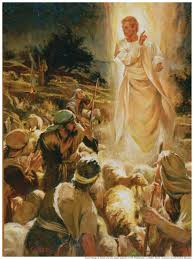Bj – Jesus is Tempted in the Wilderness Matthew 4:1-11; Mark 1:12-13; Luke 4:1-13
Jesus is Tempted in the Wilderness
Matthew 4:1-11; Mark 1:12-13; Luke 4:1-13
Jesus is tempted in the wilderness DIG: Under what circumstances was Yeshua tempted? For each of the three temptations: What was its nature? What potentially might appeal to Jesus? What price would there be if He would to give in to it? How does the Adversary’s use of Scripture differ from the way the Lord uses it? How did Christ combat Satan during His temptations? Why were the temptations all directed against the divine Son of God, when this had just been confirmed at Messiah’s baptism? Why did ADONAI allow His Son to go through this?
REFLECT: What spiritual wilderness has God sent you into? What has that done for your sense of His love? How did it change you? Notice the tempter attacked Jesus when He was vulnerable. He uses the same tactic with us. If the deceiver had three shots at you, what three temptations would he use? What is your greatest temptation right now? How are we to combat the devil with our temptations (Ephesians 6:10-17)?
The clear relationship between Christ’s baptism and His temptation should not be missed. This connection is seen in two ways. First, at His baptism He said He came to fulfill all righteousness. At the temptations of Jesus, this righteousness was tested. Second, at the baptism of Yeshua He was declared to be the Son of God by God the Father. At the temptations of Jesus, He will be tempted to prove it.
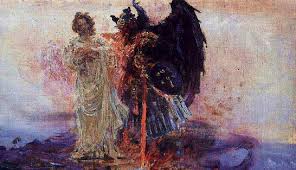
Both ADONAI and Beelzebub had a purpose for the three temptations. Satan’s purpose was to cause Messiah to sin. The means was to keep Yeshua from the cross by offering Him a short cut to His messianic goal, which was for Christ to inherit and rule all the kingdoms of the world. This is exactly what the evil one offered Him. While Satan wanted to have the Meshiach killed, he did not want Him to die at the proper time (Pesach) or in the proper way (crucifixion). That is why throughout the life and ministry of Jesus there were numerous attempts to have Him killed prematurely in a wrong manner such as by the sword or by stoning. If the Son of God had died in at any other time, or in any other way there would have been no atonement (see my commentary on Exodus, to see link click Bz – Redemption). God’s purpose was to prove the sinlessness of His Son. YHVH did not merely want to prove that Jesus was able to restrain Himself from sinning, but more importantly, to prove that Christ was not even able to sin in the first place.272
In rabbinic literature, the prince of demons is said to be involved in three specific actions – he seduces people, he accuses them before God, and he brings punishment of death (Tractate Bava Batra 16a). The deceiver is also said to have instigated the Golden Calf incident in the wilderness by (see my commentary on Exodus, to see link click Gr – Aaron Made an Idol in the Shape of a Calf), after forty days, stirring up turmoil in Isra’el and casting doubt on the return of Moshe from the mountain (Tractate Shabbat 89a). Since his rebellion before the creation, Lucifer has opposed the plan of ADONAI. Not surprisingly, that ancient Serpent comes to oppose Yeshua, yet God the Father will use it to test and prepare His Son for the messianic mission.273
As Arnold Fruchtenbaum points out, Messiah plays a representative role for two groups of people in the temptations. First, He was representative of Isra’el in five ways. First, in the use of the term the son of God. Whereas Isra’el is the son of God nationally, Jesus is the Son of God individually. This is to show where Isra’el was not obedient, Messiah was obedient; where Isra’el had failed, Christ succeeded. Isra’el is called the son of God (Exodus 4:22-23; Hosea 11:1), and Jesus is called the Son of God.
The second way of seeing this relationship between Yeshua and Isra’el in these temptations is that both testings occurred in the wilderness. First Corinthians 10:1-13 states that the wilderness was not merely a place for Isra’el to pass through between Sinai and the Promise Land; it was also a place where God was testing the loyalty and faithfulness of Isra’el. The Meshiach was also tested in the wilderness. Mark 1:13 states that Jesus was in the wilderness forty days. Matthew 4:1 and Luke 4:1 both make the same point. He was taken into the wilderness just as Isra’el was, and for the same reason: to be tested.
The third way this representative role between Yeshua and Isra’el is seen is in the figure forty. Isra’el was tempted for forty years (Deuteronomy 8:2), Jesus was tempted for forty days by the great dragon. This is an apt translation of the Hebrew word satan, as it describes the fallen angel who opposes all that God is trying to establish.274 The Hebrew word tempted is a present tense participle, and speaks of continuous action. Satan tempted the Messiah constantly for forty days.
The fourth way this relationship between Jesus and Isra’el is illustrated in these temptations is by the presence of the Spirit. The Ruach Ha’Kodesh was present with Isra’el in the wilderness (Isaiah 63:7-14), and the Holy Spirit was present with Jesus in the wilderness. Jesus, full of the Spirit, left the Jordan and was immediately driven by the Spirit into the wilderness of Judea, which consists of desert and foothills (Mark 1:12). The word driven is a very strong word (from ekballo, literally to throw out from, to drive out). The first act of the indwelling Spirit of God was to bring the Messiah to the place of testing and temptation.
The fifth way the relationship between the Son of God and Isra’el is brought out in these temptations is that when He resisted the Enemy of souls by the by use of Scripture, all three of Yeshua’s responses came from the book of Deuteronomy. Received at the foot of Mt. Sinai before being led through their wilderness wanderings, the book of Deuteronomy is the covenant book between ADONAI and Isra’el. The word deuteronomy means second law because it served as a summary of many of the commandments already found in Exodus, Leviticus and Numbers. However, the purpose of Deuteronomy is not merely to repeat those commandments, but, to put them in a format of an ancient contract or covenant. It was no accident, then, that Yeshua quoted from the book of Deuteronomy when tempted, because it is Ha’Shem’s covenant with the nation of Isra’el.
In these five ways, Messiah played a representative role on behalf of Isra’el. The point is that where Isra’el, the national son of God, failed; Jesus, the unique, eternal, individual Son of God, succeeded on Isra’el’s behalf. He became Isra’el’s substitute, not only in these three temptations, but also as the final substitute, the sacrifice for sin.
Secondly, Yeshua played a representative role for of all mankind. The Bible teaches that we do not have a high priest who is unable to sympathize with our weaknesses, but we have one who has been tempted in every way, just as we are – yet He was without sin (Hebrews 4:15). This does not mean that we are tempted in every way that He was, or that He was tempted in every single way that we are. For example, I have never been tempted to turn stones into bread. Or Christ was never been tempted to spend His whole day wasting time surfing the internet. It means that we suffer temptations in the same three categories that Jesus suffered temptations: For everything in the world – the lust of the flesh (the first temptation), the lust of the eyes (the third temptation), and the pride of life (the second temptation) – comes not from the Father but from the world (First John 2:16). Consequently, every specific temptation will fall into one of these three categories.275
The First Temptation: After fasting forty days and forty nights, He was hungry and was tempted by the devil (Matthew 4:2; Luke 4:2). The fast for forty days and forty nights would sound familiar to Mattityahu readers, as this parallels the experience of both Moses (Exodus 34:28) and of Elijah (First Kings 19:8). After fasting for forty days, both Matthew and Luke record what seems to be an obvious understatement – that He was hungry. In the first hunger pangs of a fast, a person may have an extended period of time during which the body is strong with no ill effects from the lack of food as it draws on the stored excess fat. But, around forty days into the fast, there will be some new pangs. These are not merely due to the hunger, but actually indicate that the body is beginning to starve itself. Jesus was at a critical point when the great dragon came to Him with the first of three incredible temptations.
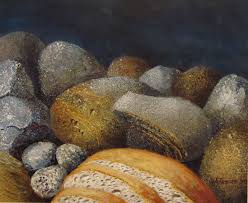
The first test centers on the claim that Yeshua is the Son of God. The tempter came to Him and said: If You are the Son of God, tell these stones to become bread (Matthew 4:3; Luke 4:3). Satan first suggested what Christ ought to do for Himself. This first temptation was essentially the same mocking taunt that the crowds made at the crucifixion: If You are the Son of God, come down from the cross (Mattityahu 27:40-43 NASB). It also included the wicked attempt to cause the Second Adam (First Corinthians 15:45-47) to fail where the first Adam had failed – in relation to food. The deceiver wanted the Messiah to fail because of bread, just as Adam had failed because of fruit (Genesis 3:1-7). Above all, however, he wanted to solicit the Son’s rebellion against the Father. This was a test of Yeshua’s relationship with God.
The Adversary tempted Jesus with the lust of the flesh because the temptation of bread after forty days and forty nights must have been virtually overwhelming (First John 2:16a). We must remember that the Meshiach was one-hundred percent God and one-hundred percent man. Consequently, in His humanity Yeshua could feel the full force of the hunger. But, because of His divine nature, He could not give in to such testing. It would have disqualified Him from being the sinless Redeemer. For we do not have a High Priest who is unable to empathize with our weaknesses, but we have One who has been tempted in every way, just as we are- yet He did not sin (Hebrews 4:15).
It was the absolute trust and submission between God the Father and God the Son that the ancient Serpent sought to shatter. To have succeeded would have put an irreparable rift in the Trinity. They would no longer have been Three-in-One, no longer have been of one mind and purpose. In his incalculable pride and wickedness, the prince of demons tried to fracture the very nature of God Himself.276
Jesus responded by quoting Deuteronomy 8:3 where Isra’el was tested with hunger so she would learn dependence on God. But she failed to do so. However, Yeshua succeeded by saying: It is written: “Man shall not live on bread alone, but on every word that comes from the mouth of ADONAI” (Mattityahu 4:4; Luke 4:4). If the Word of God was His only resource to fight Satan, shouldn’t we recognize that it should also be ours? The main “food” ADONAI has given to strengthen us is the Bible, the Word of God.277
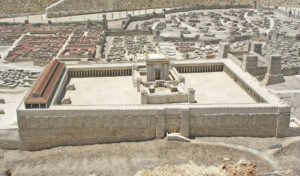
The Second Temptation: The evil one had first suggested what Christ ought to do for Himself (turning stones into bread). Next he suggested what the Father ought to do for Yeshua (proving the Father’s love for Jesus by sending His angels to rescue His Son). Having failed to induce Messiah to use His divine powers to serve His own self-interests and in that way rebel against the will of His Father, the deceiver continued to tempt the Son to put His heavenly Father’s love and power to the test. Then the devil led Him to the holy city of Jerusalem and had Him stand on the highest point of the Temple Mount (Mt 4:5; Lk 4:9a). The dizzying vantage point in the southeast corner of the Temple Mount was specifically from the Royal Stoa. Both Matthew and Luke use the same Greek word pterygion, which is a diminutive form of pteryx or wing. In New Covenant times, pterygion generally described the outermost part of something. So this expression can be translated tower, apex, peak or extreme point.
Both Matthew and Luke have the definite article coming before pterygion, which indicates that a specific, well known highest point is being dealt with. Not only that, but both authors use the word hieron or Temple Mount, and not naos or Sanctuary, for the expression the highest point of the Temple. Once this is understood, the spot is easy to identify. The most imposing vantage point in the entire Temple Mount is described by the Jewish historian Josephus. He wrote: The Royal Stoa was a structure was more noteworthy than any under the sun. The depth of the ravine [below] was so great, when combined with the height of the Stoa, that no one [would dare] bend over [the ledge] because he would become so dizzy he wouldn’t be able to see the end of the measureless depth (paraphrased for readability).278 Josephus also reported that the drop to the valley floor was some 450 feet. According to early tradition, James, the brother of Jesus and head of the Jerusalem congregation, was martyred by being thrown from the Royal Stoa because he would not renounce his faith.
A midrash, a commentary on the TaNaKh, puts particular emphasis on this exact place, as it states: Our teachers taught, at the time when the King Messiah will appear, He will come and stand upon the roof of the Temple. He will proclaim to Isra’el and will say to the humble, “The time of your redemption has arrived” (Peshikta Rabbati 36).279
Still hoping to undermine the Lord’s relationship with ADONAI as His divine Son, the ancient Serpent again introduced his temptation with the words: If you are the Son of God, throw Yourself down from here. In the first temptation a need (the lack of food) already existed; in the second a need was created. To make the temptation more persuasive, the great dragon quoted Scripture, as Jesus had just done. Quoting Psalm 91:11-12, he said: For it is written, “He will command His angels concerning You to guard you carefully; and they will lift You up in their hands, so that You will not strike Your foot against a stone” (Mt 4:6; Lk 4:9b-10).
With that subtle and clever twist of quoting Psalm 91:11-12, the deceiver thought he had backed Messiah into a corner. It’s as if Satan was saying, “You claim to be God’s Son and trust His Word, so why don’t you demonstrate your Sonship and prove the truth of His Word by putting Him to a test – a scriptural test? If you won’t use your own divine power to help yourself, let your Father use His divine power to help You.” For Jesus to have followed the devil’s suggestion to be saved by heavenly angels would have been, in the eyes of many Jews, sure proof that He was the Messiah.
The miraculous has always appealed to the flesh. Later, Yeshua Himself would warn against this when He warned that false messiahs and false prophets will appear and perform great signs and wonders to deceive, if possible, even the elect (Matthew 24:24). But, such dramatic signs, even when they are from God, do not produce faith; they only strengthen the faith of those who already believe. The same sun softens wax and hardens clay. Yeshua was the greatest sign ever given by Ha’Shem to mankind, yet, as Isaiah prophesied hundreds of years earlier: He was despised and rejected by mankind (Isaiah 53:3; Luke 18:31-33).280 Those who would sing His praises only because of His miracles and impressive words would later turn against Him. This temptation was to get Yeshua to prove that He was really the Son of God. Thus, Satan again tempted Him with the pride of life, which was, in reality, a test on Jesus’ dependence upon the Father.
Jesus would have no part of cheap, faithless sensationalism. So He responded by quoting Deuteronomy 6:16 where Isra’el was tested with thirst so she would learn dependence on God (see my commentary on Exodus Cu – Strike the Rock and Water Will Come Out of It). But, where she failed to trust God, Jesus succeeded by answered the devil saying: It is also written: “Do not put ADONAI your God to the test” (Matthew 4:7; Luke 4:12). Jesus didn’t need to prove to Himself that the Father loved and protected Him. Moreover, He knew that God’s love and protection could not be proved to others by any means but faith. As the writer to the Hebrews would say: Now faith is confidence in what we hope for and assurance about what we do not see (Hebrews 11:1). For it is by grace you have been saved, through faith – and this is not from yourselves, it is the gift of God – not by works, so that no one can boast (Ephesians 2:8-9).

The Third Temptation: The Adversary then dropped all pretenses and made one final, desperate effort to corrupt Jesus. He finally revealed his ultimate purpose: to induce Messiah to worship him. He had first suggested what Christ ought to do for Himself (turning stones into bread). Next he suggested what the Father ought to do for Jesus (proving the Father’s love for Yeshua by sending His angels to rescue His Son). Now he suggested what the tempter could do for Jesus – in exchange for what Messiah could do for him – quid-pro-quo you might say.281 Again, the great dragon took the Lord to a very high mountain and, in an instant, showed Him all the kingdoms of the world and their splendor that Jesus could easily attain if He bypassed the cross (Matthew 4:8; Luke 4:5). Satan, who was, and is, the prince of the kingdoms of the world, had every right to make Yeshua that offer.
And the devil said to Him, “I will give you all their authority and splendor; it has been given to me, and I can give it to anyone I want to.” (Mattityahu 4:8; Luke 4:6). Until the Lord returns with the title deed to the earth (see my commentary on Revelation Ce – The Lion of the Tribe of Judah, the Root of David Has Triumphed), the devil is the god of this age (Second Corinthians 4:4). But, by asking Jesus to bow down and worship him, Messiah would be placing Himself in submission to, and acknowledging the superiority of, the Adversary. This would have the advantage of bypassing the cross and gaining the messianic goal anyway. It was as if Satan was saying, “Why should You have to wait for what is already Yours? You deserve it now! Why do You submit as a Servant when You could reign as a King? I am only offering You what the Father has already promised.” It will not be the ancient Serpent’s last attempt to prevent Yeshua from dying on the cross. But here, Christ could see the power and wealth that would be His; thus, this temptation was in the area of the lust of the eyes. This was a test of Jesus’ submission to God’s program of salvation.
Satan is a liar and the father of lies and there is no truth in him (John 8:44). What he really demanded in the wilderness was the soul of the Messiah: If You will bow down and worship me, all that You see will all be Yours (Matthew 4:9; Luke 4:7). The tempter had rebelled against God in the first place because he could not tolerate being second to the Trinity. Here, he thought, was his great opportunity. He could bribe the Son to worship at his feet.282 When you deal with him, he always takes you further than you want to go, and costs you more than you want to pay. What shortcut on his terms has he offered you lately?
Jesus responded by quoting Deuteronomy 6:13 where Isra’el was tested to serve ADONAI only; however, she failed to do so (see my commentary on Exodus Gr – Aaron Made an Idol in the Shape of a Calf). But, Jesus said to the devil: Away from me, Satan! For the TaNaKh says: “Worship ADONAI your God, and serve only Him” (Mattityahu 4:10; Luke 4:8 CJB). Once again the Lord quoted Deuteronomy, this time from Deuteronomy 6:13. The first Adam fell into sin in a perfect and harmonious environment in the Garden of Eden, while the last Adam maintained His sinlessness in an environment that was hostile.
When Jesus resisted these temptations, He did not rebuke the great dragon, call him names, nor did He bind him. Christ merely quoted Deuteronomy 6:16. And each time Satan either misapplied the Scriptures, or used them in a deceitful way, which is one of his favorite tricks. Yeshua simply defended Himself with the sword of the Spirit, which is the Word of God (Ephesians 6:17b). That’s one thing the devil can’t stand! The Word of God defeats him every time. Three times Messiah quoted Deuteronomy. When we encounter spiritual warfare from the evil one, this is the way we should resist him as well.283
Both Matthew and Luke record three temptations, but Luke reverses the order of the last two. The adverbs then (Greek: tote) in Matthew 4:5 and the again (Greek: palin) in verse 8 indicates that Mattityahu is recording the event chronologically. Luke, on the other hand, uses the conjunction and (Greek: kai), which does not suggest a sequential order. While Matthew records the event chronologically, Luke may be listing the temptations topically. For Luke, the temptation at the highest point of the Temple Mount was the climax of the event.284 In this harmony of the gospels, I use Matthew’s chronological order.
Beware of enticements that seem to cost little for the present. The devil hopes to get you to do things his way. And he doesn’t give up easily. When the deceiver had finished tempting Yeshua, he left Him until a more opportune time (Luke 4:13). Satan was still active during all of Christ’s ministry (Luke 8:12, 10:17-18, 11:14-22, 13:11-17). This statement, rather, indicates that a direct confrontation with the ancient Serpent (such as we read of here in the three temptations) did not occur again until the arrest, trial and crucifixion.285
Jesus was with the wild animals, and angels came and attended, or ministered to Him (Matthew4:11; Mark 1:13b). The word attended is in the imperfect tense, indicating continuous action. All during the forty days, the angels continually ministered to Him. This is a vivid picture of spiritual crisis. The only other time this happens is in the garden of Gethsemane (Lk 22:43-44). We are not told what the ministry of the angels included, but surely they brought Jesus food to satisfy His hunger. We know they could not have been in the presence of God without offering Him worship. And they could not have come from heaven without bringing strengthening words of assurance and love from the Father.286
Not only did Yeshua pass these crucial tests of His messiahship, but His Word also provides some vital lessons for us today. Be alert and of sober mind. Your enemy the devil prowls around like a roaring lion looking for someone to devour. Resist him, standing firm in the faith, because you know that the family of believers throughout the world is undergoing the same kind of sufferings (First Peter 5:8-9). Consequently, we should not resist him by arguing, binding, or debating in some spiritual manner (by the way, whoever is binding Satan is doing a pretty poor job. I don’t know how it is where you live, but in my neighborhood, the tempter is still pretty active). Jesus simply quoted Scripture. The rabbis understood that Isra’el possessed a secret weapon to overcome the evil one: The Holy One, blessed be He, said to Isra’el, My children, I have created the evil impulse, and I have created the Torah as an antidote to it; if you occupy yourselves with Torah you will not be delivered into its power (Tractate Kiddushin 30b). Should we not do likewise?
Lord, help me see the deceiver’s offers for what they are – enticements to sin. Help me to keep my eyes and my heart focused on You and Your Word, and my ears attentive to You in prayer. Amen.










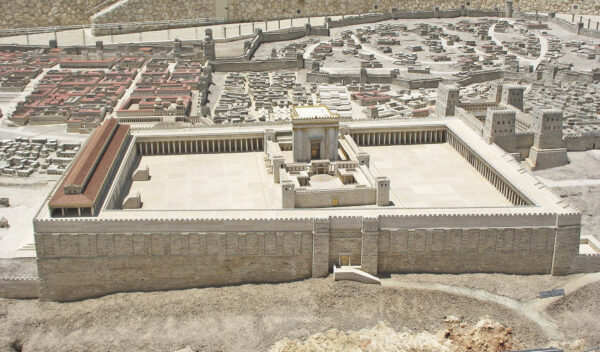

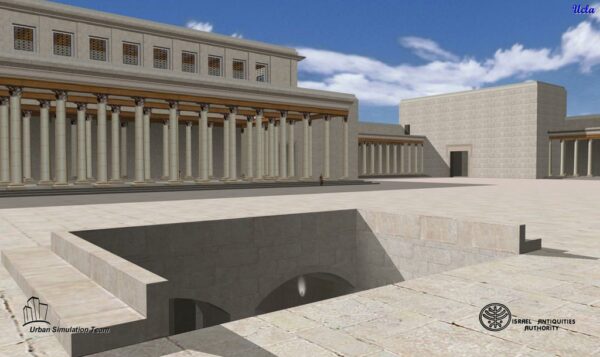
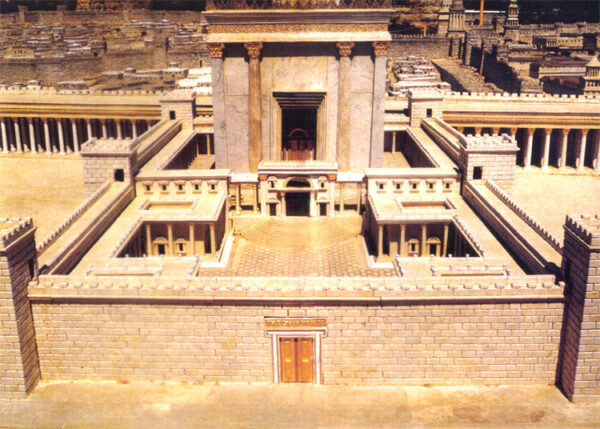 This inner area of the Temple compound was open to both men and women. Certainly, it was the common place for worship for everyone and functioned to a certain extent as a Temple synagogue in the open air. It was a large area that covered 70.87 by 70.87 meters, 5,023 square meters, or 16,475 square feet.199 All around it ran a simple porch 60 feet square. Just a few days earlier at the height of the Passover it was capable of holding up to 6,000 worshipers. But, now with the so-called half-holidays, many of the pilgrims had returned home. It was still crowded enough, however, that it took longer than they wanted to finally come to the conclusion that Jesus was nowhere in sight.
This inner area of the Temple compound was open to both men and women. Certainly, it was the common place for worship for everyone and functioned to a certain extent as a Temple synagogue in the open air. It was a large area that covered 70.87 by 70.87 meters, 5,023 square meters, or 16,475 square feet.199 All around it ran a simple porch 60 feet square. Just a few days earlier at the height of the Passover it was capable of holding up to 6,000 worshipers. But, now with the so-called half-holidays, many of the pilgrims had returned home. It was still crowded enough, however, that it took longer than they wanted to finally come to the conclusion that Jesus was nowhere in sight.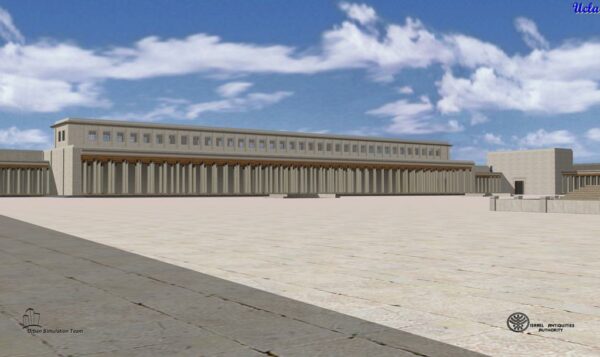 It was a large open-air plaza that ran the length of the entire southern wall. It was built according to the plan of a basilica, or a large structure in ancient Rome. Rectangular in design, it consisted of a roofed hall entered from porticos at each end. It had a wide central aisle, or nave, and was separated from the two side aisles by rows of columns. The nave walls rose above the aisle roofs and were constructed with windows to admit light. It was not a sacred place and was actually an extension of the Court of the Gentiles.
It was a large open-air plaza that ran the length of the entire southern wall. It was built according to the plan of a basilica, or a large structure in ancient Rome. Rectangular in design, it consisted of a roofed hall entered from porticos at each end. It had a wide central aisle, or nave, and was separated from the two side aisles by rows of columns. The nave walls rose above the aisle roofs and were constructed with windows to admit light. It was not a sacred place and was actually an extension of the Court of the Gentiles. 






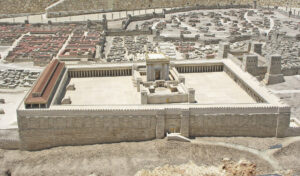
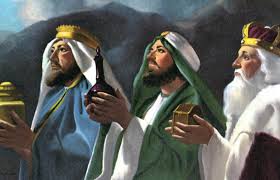
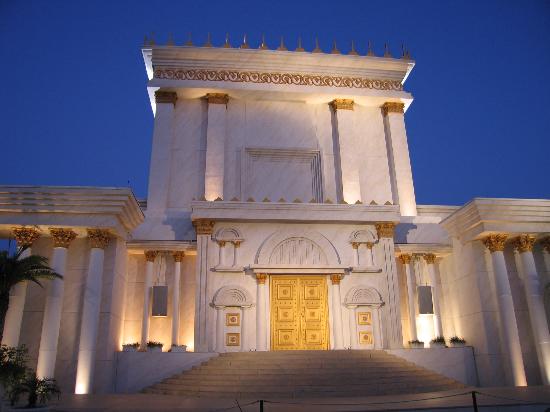 and take from her hands the offering that she brought. While a priest slaughtered the doves she was offering on the bronze altar (see my commentary on
and take from her hands the offering that she brought. While a priest slaughtered the doves she was offering on the bronze altar (see my commentary on  was not just limited to the women. Any Jew who was ceremonially clean could go into this area – men, women and children.
was not just limited to the women. Any Jew who was ceremonially clean could go into this area – men, women and children. 



